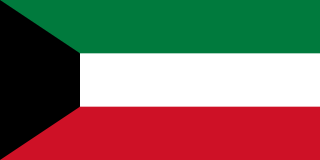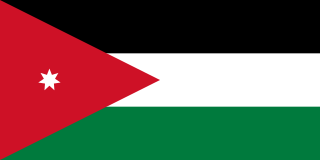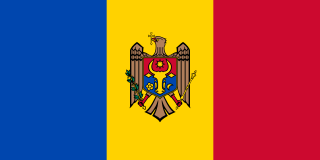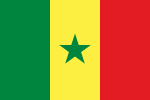
Senegal, officially the Republic of Senegal, is a country in West Africa. Senegal is bordered by Mauritania in the north, Mali to the east, Guinea to the southeast, and Guinea-Bissau to the southwest. Senegal nearly surrounds The Gambia, a country occupying a narrow sliver of land along the banks of the Gambia River, which separates Senegal's southern region of Casamance from the rest of the country. Senegal also shares a maritime border with Cape Verde. Senegal's economic and political capital is Dakar.

Politics in Senegal takes place within the framework of a presidential democratic republic. The President of Senegal is the head of state and government. Executive power in Senegal is concentrated in the president's hands.

Abdoulaye Wade is a Senegalese politician who was President of Senegal from 2000 to 2012. He is also the Secretary-General of the Senegalese Democratic Party (PDS), having led the party since it was founded in 1974. A long-time opposition leader, he ran for President four times, beginning in 1978, before he was elected in 2000. He won re-election in 2007 with a majority in the first round, but in 2012 he was defeated in a controversial bid for a third term.

Macky Sall is a Senegalese politician who has been President of Senegal since April 2012. He was re-elected President in the first round voting in February 2019 Senegalese presidential election. Under President Abdoulaye Wade, Sall was Prime Minister of Senegal from July 2004 to June 2007 and President of the National Assembly from June 2007 to November 2008. He was the Mayor of Fatick from 2002 to 2008 and held that post again from 2009 to 2012.

Presidential elections were held in Senegal on 26 February 2012, amidst controversy over the constitutional validity of a third term for incumbent president Abdoulaye Wade. In the runoff on 25 March, Macky Sall defeated the incumbent president. The 2015 documentary film Incorruptible chronicles both campaigns as well as the youth movement Y'en Marre, which led protests against Wade's administration.

Aminata Touré is a Senegalese politician who served as the Prime Minister of Senegal from 1 September 2013 to 4 July 2014. She was the second female Prime Minister of Senegal after Mame Madior Boye, and she previously served as Justice Minister from 2012 to 2013.

Corruption in Romania is considered a major problem. According to Transparency International's annual Corruption Perceptions Index, as of 2020, Romania is the 69th least corrupt country out of 180 countries, up from 70th place in 2018, and the third most corrupt in the European Union. In the 2014 EU Anti-Corruption Report, 57% of the Romanians were most likely to say they are personally affected by corruption. Corruption can be found both in the public sector and in private businesses, and poses concerns for foreign investors. Although there have been improvements since the late 1990s, corruption remains a problem in Romania as it is especially found on all levels of public office, in the police force as well as in the judiciary system.

In general, Belgium has a well-developed legal and institutional framework for fighting against corruption. Transparency International's 2017 Corruption Perception Index ranks the country 16th place out of 180 countries.

Corruption in Sweden has been defined as "the abuse of power" by Swedish National Council for Crime Prevention (Brå). By receiving bribes, bribe takers abuse their position of power, which is consistent with how the National Anti-Corruption Unit of the Swedish Prosecution Authority specifies the term. Although bribes and improper rewards are central in the definition of corruption in Sweden, corruption in the sense of "abuse of power" can also manifest itself in other crimes such as misuse of office, embezzlement, fraud and breach of trust against a principal.

This article is about corruption in Tanzania.

Transparency International's 2016 Corruption Perception Index ranks the country 101st place out of 176 countries.

According to several public surveys in Kosovo and reports from institutions such as the European Commission, levels of corruption and impunity among politicians are high. Transparency International's 2017 Corruption Perception Index ranks the country 85th place out of 180 countries.

Corruption in Kuwait is a problem resulting in political tensions in society. Transparency International's 2017 Corruption Perception Index ranks the country 85th place out of 180 countries.

Corruption in Jordan is a social and economic issue.

The government in Moldova has in recent years taken several steps to fight corruption, including law enforcement and institutional setups. The prosecution of officials who are involved in corruption has also increased in recent years. However, businesses consider corruption a serious problem for doing business, and the business environment continues to be one of the most challenging in the region.

Corruption remains a serious problem for doing business in Nicaragua. Transparency International's 2017 Corruption Perception Index ranks the country 151st place out of 180 countries. According to Freedom House, since the election of Daniel Ortega in 2006, corruption had increased in Nicaragua.

There are several sectors in Ethiopia where businesses are particularly vulnerable to corruption. Land distribution and administration is a sector where corruption is institutionalized, and facilitation payments as well as bribes are often demanded from businesses when they deal with land-related issues.

Corruption levels are perceived to be high by surveyed residents of Serbia, and public trust in key institutions remains low.

Corruption in Myanmar is an extremely serious problem. Owing to failures in regulation and enforcement, corruption flourishes in every sector of government and business. Many foreign businesspeople consider corruption "a serious barrier to investment and trade in Myanmar." A U.N. survey in May 2014 concluded that corruption is the greatest hindrance for business in Myanmar.

Canada–Senegal relations refers to the diplomatic relations between Canada and Senegal. Both nations are members of the Organisation internationale de la Francophonie.




















